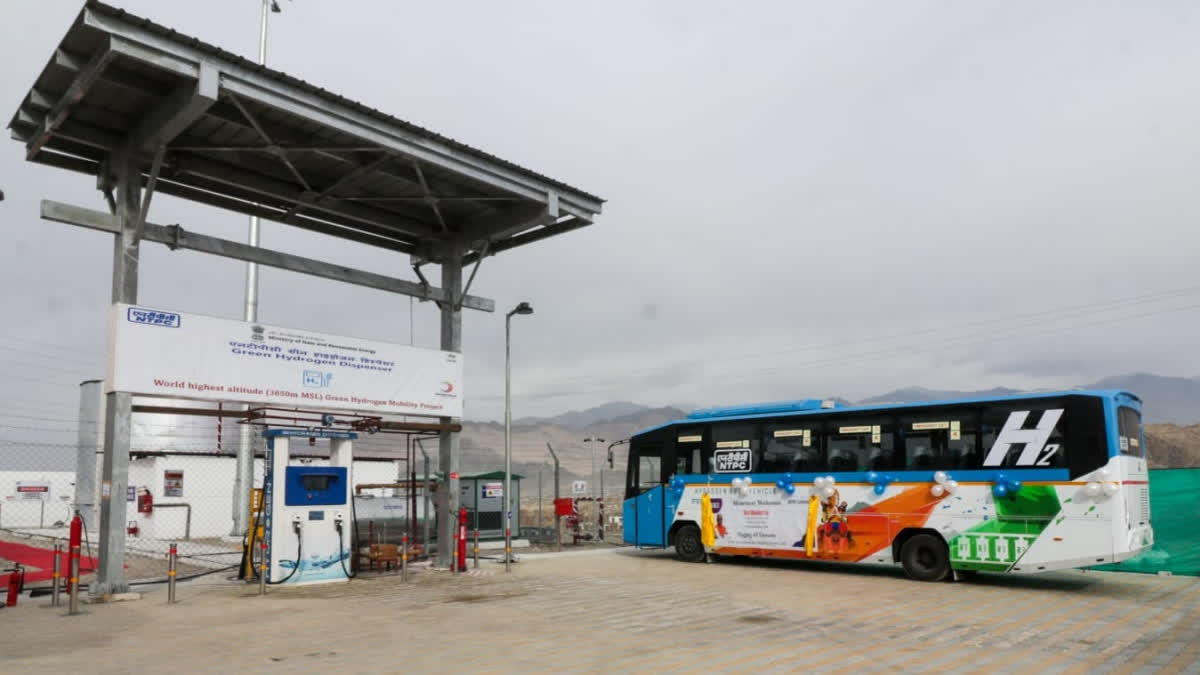Leh:In an initiative aimed at making Ladakh India’s first carbon-neutral region, NTPC, in collaboration with the Ministry of Renewable Energy, has launched the country's first Green Hydrogen Mobility Project. Conceptualised by Prime Minister Narendra Modi and initiated in 2022, this project is set to redefine eco-friendly transportation at the world’s highest altitude, showcasing India’s commitment to combating climate change.
Ladakh, often referred to as the ‘third pole’ due to its cold desert climate, is highly vulnerable to climate change. This project aims to mitigate the impacts of climate variations by introducing Fuel Cell Electric Buses (FCEBs) powered by green hydrogen—a fuel produced entirely through renewable energy sources like solar power.
Dixit Kumar Jha, Assistant Manager at NTPC Leh Ladakh, explains, “This project is the first of its kind, designed to demonstrate how hydrogen-based mobility can transform the transportation sector. The project’s cornerstone is a 1.7 MW solar plant that powers the electrolysis process, breaking down water into hydrogen and oxygen. The hydrogen is stored at high pressure (450 bar) and used to fuel buses equipped with advanced safety and comfort features. These buses emit only water, making them 100% eco-friendly. The fuel cell buses emit zero carbon emissions and the only byproduct is water.”
He continued, “Each bus can run up to minimum 225 kms per day, collectively covering nearly 1,000 kms daily with the current fleet of five buses. The project has the capacity to produce 80 kilograms of hydrogen per day, sufficient to fuel these buses efficiently.
Operating at an altitude where temperatures drop to -25°C, this project stands as a testament to cutting-edge engineering. Safety measures include hydrogen sensors to detect leaks, emergency shutdown systems, and an SOS mechanism for passenger security. The luxury buses come equipped with reclining seats, heating, air conditioning, and entertainment systems, ensuring a comfortable and memorable ride for locals and tourists alike.
He said, “Within a month, the buses will be handed over to the UT administration of Ladakh, with NTPC providing free fuel and maintenance as part of the pilot demonstration. Actually, it will not just be a ride but an experience for the local people here.”
Additionally, the NTPC is planning a Microgrid Project in Chushul, which will provide an independent power source for the Indian Army. Using similar hydrogen-based technology, this project aims to offer round-the-clock power supply in one of the region's harshest terrains.
“At that location, with such temperatures, the batteries will degrade very quickly. To address this challenge, we are introducing a fuel cell system. Hydrogen will be produced during the day and stored, then used in the fuel cell at night to generate electrical energy. This ensures a round-the-clock power supply. The foundation stone for this project was laid by Defence Minister Rajnath Singh three to four months ago,” added Dixit Kumar Jha.
